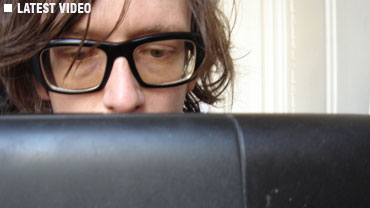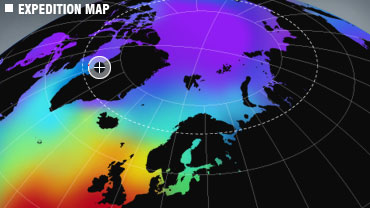Two standard responses to the problem of global warming are that either it’s not really happening or, if it is, there’s nothing we can do about it now so why not leave all the lights on? Well, it is happening, and the sooner we tame our energy emissions, the sooner the earth can return to being habitable for the citizens and other creatures of the 22nd century. Time is unlikely to stop when we die, it just seems that way sometimes. It’s true that we on this Cape Farewell expedition used aviation fuel and diesel to get here, but we will take the story back with us and spread it like butter on the toast of our item-rich society. As the scientists aboard research the effects of ice-melt on the ocean bed, and trace the possible mutation of the Gulf-stream through salination tests, we artists are being exposed to a landscape that cannot fail to affect our work.
Slugs leave trails, sheep leave droppings, bees make honey, and humans leave two things: art and garbage. Where these meet is called entertainment. Like others on this ship, I am an entertainer. Last night some of us played in Murphy’s bar in Ilulissat, a small Greenlandic town which has a post office, fire station, and much laundry out to dry, despite being under a foot of snow. Some young local musicians played a fine set of blues rock, aided by KT Tunstall, Feist and myself with a couple of scientists from the expedition on backing vocals.
Earlier in the day, I was lucky enough to see Marcus Brigstocke half way up a snowy crag, doing a stand-up routine in his corduroy suit. As this was for the cameras, we were told not to laugh, which made his show even funnier. As his fingers froze, Marcus ranted on the malevolent spirit of Londoners in traffic, cursing into mobiles about other cell-phone users at the wheel. In the distance behind him stretched miles of slowly crumbling blue icebergs, a terrain most of us had never seen before and, if we leave it more than 10 years, will never see again.
Just prior to that, as we reached the summit, we discussed The Edgar Broughton Band and the 1970 Isle Of Wight Festival: the more majestic the ice-scape around us, the more we sheathed ourselves in pop culture. We are stardust, we are golden, and we make one hell of a mess. Greenland has been assaulted by alcohol (‘mad water’) and Christianity, now it has the chance to make some money selling its oil. This would be like giving a terminal lung-cancer patient a consignment of duty-free cigarettes.
The great Isfjord is home to a glacier that has lost 15 kilometers in as many years. The icebergs shed by this float around Ilulissat harbour, shot through with a luminous blue and looking edible, somewhere between ice cream and cheese. Like those other endangered killers, the polar bear and the human, the icebergs can look very attractive. Scattered on the sea or washed ashore, each one has a shape that suggests something: a pie on the horizon, a body under a sheet, a giant nose set free from its face, or a grinning frog’s head. Deep blue veins run through them, water that has entered the cracks as the glacier sheds itself and then frozen. The ever-shifting Arctic light gives the colours of the icebergs a range from pink to grey, but the blue luminescence that suffuses them is their most magical quality. The purpose of human existence may now be simply to go shopping, but a glint of meaning is to be found by anyone lucky enough to see these floating apparitions. Look but don’t touch.
This post was published in the Independent on Friday 3rd October.




2 Comments
Toby Jeffries
That photo was the centrefold in todays Independent! Pity they didn’t use any of your perceptive observations or turns of phrase, though.
Jim The Reptile
Hi Robyn,
Thanks for the riviting icy reports.
I like your slug trail theory very much: ‘art & garbage'(and perhaps stones?) being all that remains. This seems a profound notion.
It made me wonder what art will mean when this world has thawed and then re-frozen a million times and we finally slide like a hissing ice cube into the chamber of the sun.
It must be a struggle for an artist like yourself to see crumbling iceburgs not merely as a metaphor for the fragility of art but for what they are: ice becoming water in an inexorable process. I know how art likes to endure and reflect upon itself even in the face of ice and fire. You seem to be facing the reality, though, and describing it perfectly – for that I salute you, sir.
The fluid from which we are born (swimming) and the ether of the skies seem to meet where you are there at the Pole. I hope it is not too cold a place and that any neccessary freezing takes place beyond that fearsome red woolen hat of yours rather than inwards to the heart.
Good luck from southern England. Bring back the art in the form of an icicle cathedral – or maybe a glittery shoal of songs.
Goddess bless.
Jim